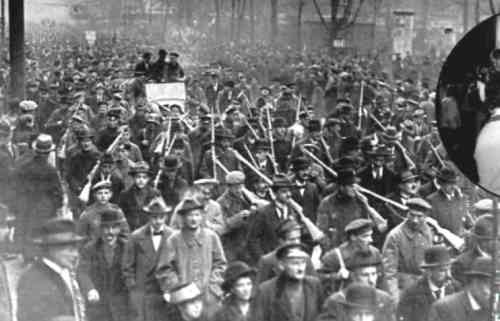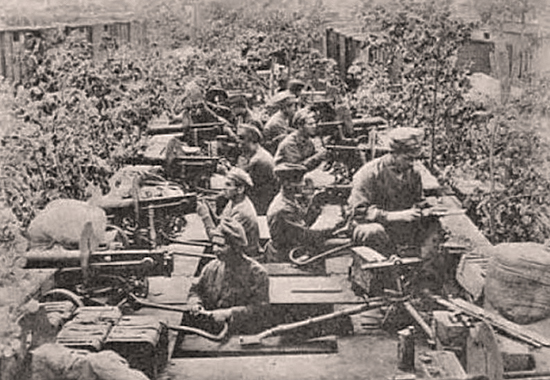Chapter VI: The Crucible
______________
Time Period: June, 1920 - July, 1920
“
No, we shall not abandon our comrades in the Ruhr,” said Rosa Luxemburg as she placed her finger upon a map of the Rhineland. “It’s time the Red Army liberate the workers from the bourgeois-yoke of the Essen-SPD.”
With the rest of the leadership galvanized by her words, Rosa immediately recalled senior army officers Thalmann and Musahm from their encampment on the Oder River.
“With the French Army in mutiny, and Britain rapidly losing its stomach for war, our window to strike at the Essen government is as open as it will ever be,” said Rosa to both men. “Therefore our forces must be decisive in its initial thrust into the Ruhr – we
cannot risk a protracted conflict.”
“And what of the Americans? – While many have already demobilized and returned home across the Atlantic, some still remain in France,” interjected Thalmann. “It is yet another risk we must face, gentlemen,” responded Rosa.
Over the next several days, battle plans were drafted by the leaders – each of which detailed different axis of advance into the Ruhr. After many amendments, along with a series of debates and votes, the largest and most ambitious of plans was agreed upon.
______________
Labelled Red Army Directive No. 2, the operation called for the following:
• 1st and 2nd Army Groups of the Germany Red Army would be split into 4 separate Battalions under the leadership of existing senior officers Ernst Thalmann and Eric Musahm, along with newly appointed field commanders Hugo Eberlein and Heinrich Brandler.
• In rapid, successive assaults, the 1st and 2nd Battalions, populated with the most experienced veterans from the preceding year, will advance into Hannover, capture the provincial capital from the British Expeditionary forces, then remain on the defensive hold off the Freikorps advancing on the city.
• Once Phase One is completed, the 3rd and 4th battalions will advance into Essen-controlled territory several miles south of Hannover and push directly into the Rhineland.
• Upon crossing into the Ruhr, French forces will immediately be engaged with goal of expelling their garrisons west of Belgian border.
“With the Hanoverian and Rhine proletariat liberated, the Essen government will fall - and without further recourse, the allies will have no other option but to end direct action in our civil war.” said Rosa confidently.
______________
After the directive was sent down to the rest of the field command structure, preparations for the operation began immediately. Over the next two weeks, 90% of the army was redeployed on the west boarder of the communist-controlled Germany.
With the preparations completed by the end of June, and the operation scheduled to start on the first day of July, Rosa called a final meeting between the leadership of the Grand Coalition. With an end to the civil war potentially in sight, they discussed the creation of a delegation with which to attempt rapprochement with the Entente in the immediate aftermath of the Ruhr campaign.
Anticipating a hostile diplomatic environment, consideration was given to the idea of including captured Essen SPD-members in potential peace delegations. However, as the sunset on June 30th, all eyes were turned to the upcoming battle.
On the morning of July 1st, the German Red Army advanced into Essen-controlled territory. Spear-headed by the infantry, and with artillery and armor providing support from the flanks and rear. The hamlets and towns east of the Hanoverian provincial capital fell swiftly within the first hours of the attack. In the preceding weeks, French and Essen response to the Ruhr uprising had been harsh – this, coupled with the inability Essen government to construct a viable state apparatus from under the wartime Entente-yoke pushed many lay-Germans to sympathize with the Council Communists.
Thus with public resistance at minimum, the spearhead continued unabated toward the capital.
Quickly scouts from the British Expeditionary Force encamped within the province relayed word of the offensive to the rest of the European Allied command structure.
“Reports of an all-out assault on Essen-government positions from communist controlled territory in the north,” said one senior French army commander to another stationed in the Ruhr. “We must move all available garrisons forward if we want to prevent the fall of Hannover.”
However, with French occupation forces disintegrating into munity, orders to do so we’re ignored. With no hope of assistance, the BEF telegraphed London and requested an immediate withdrawal from Germany, to which Lloyd George quickly agreed. “If the Germans wish the give themselves over to the proletarian abyss then so be it – no more British lives will be wasted on this cause,” he said as he drafted the retreat order. As British troops retreated north and boarded the few Royal Navy vessels anchored at Hamburg to set sail for the blockade line, the senior SPD leadership of the Essen government called an emergency meeting. With the communists only days away from capturing the now undefended capital, fear began to spread that the provinces of the Rhineland would soon be next.
“Paris has lost control of the occupation forces; they’ve begun to loot and pillage the areas where they are garrisoned!” said a senior party member.
“Yes, but once the communists attempt to dislodge them, their battle composure will surely return!” contested another.
“Can’t you see the writing on the wall? The Allies will surely abandon us! – We must at once call up one, two - a dozen Freikorps groups to defend the Republic!”
With bickering breaking the already tentative cohesion within the SPD-Essen government, and with no clear voice to help pierce the political impasse, all sides remained paralyzed in the face of the oncoming communist onslaught.
By the close first week in July, the provincial capital of Hannover fell to the Luxemburgists, with the remaining unoccupied towns and hamlets surrendering soon after. Declaring the province liberated from the Entente-SPD yoke, leaders from Berlin declared its annexation into the German Council Republic.
With the 1st and 2nd German Red Army Battalions pausing in Hannover to rest, reequip and defend the territory from any reactionist counter-coup Junker-backed, Phase 2 officially began.
______________


